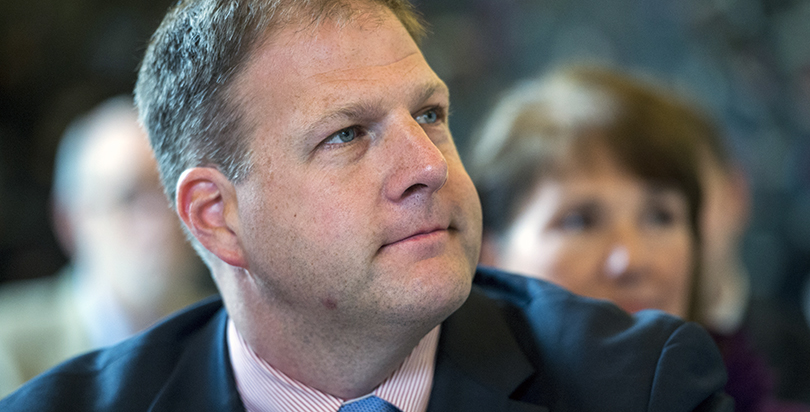Make Private School Free or Die: The Fight Over Education Savings Accounts in New Hampshire

That declaration of resistance to what many residents perceive as the heavy hand of government is reflected in the laws governing the small state, from lax gun restrictions to slight tax rates. Soon it may prevail in schooling as well, as lawmakers decide whether to create a universal system of education savings accounts and a conservative new governor works aggressively to replace the state’s education leadership with ideological allies from outside the policy world.
If new legislation passes, New Hampshire will become just the third state, after Nevada and Arizona, to allocate funds for schooling directly to parents, allowing them to spend it on the institution — including private academies and home schools — they choose.
The fight over the proposal reflects New Hampshire’s traditional preference for limited government as well as its recent evolution into an electoral battleground. The publication, in the state’s two leading newspapers, of an op-ed supporting the bill by past presidential candidate and education advocate Jeb Bush speak to how quickly issues of school choice have become nationalized.
S.B. 193, which passed a Senate vote on party lines last month, is similar to ESA bills in other states: Parents receive up to 90 percent of their children’s per-pupil state education funding (a little more than $3,000 annually in New Hampshire) to pay for private school tuition and other education-related costs. Although most state and district ESA initiatives are limited to low-income students and students with disabilities, New Hampshire’s program would be open to all.
(The 74: Video Explainer: Understanding Education Savings Accounts — in 90 Seconds or Less)
That makes it a pioneer of sorts. Nevada authorized statewide ESAs a few years ago, but it has stumbled in state courts around funding issues; Arizona’s expansion of an existing program will likely make it the first ESA system in the country open to every family (though it includes caps on annual growth). If S.B. 193 makes it through the gauntlet of New Hampshire’s House of Representatives (its 400 members make it the largest deliberative body in the country after the U.S. House), the Granite State could be next.
Not everyone is overjoyed at the prospect. Lou D’Allesandro, a longtime state legislator and one of nine Senate Democrats to oppose the bill, laments what he sees as “a sharp deviation” from “Warren Rudman Republicanism” — after the state’s former moderate senator — by conservative and libertarian Republicans, who want to undermine traditional schools.
“I think that it diminishes public education,” said D’Allesandro. “When you take dollars out of public education rather than making public education better, you dilute it, and that’s a problem.”
Republican lawmakers passed a more modest tax credit scholarship law in 2012, sustaining the measure over a gubernatorial veto and defending it against legal challenges that were ultimately tossed out by the state’s Supreme Court.
Education didn’t emerge at the center of state politics again until Republican Gov. Chris Sununu was elected last November. Within weeks of his inauguration, Sununu championed choice publicly and threw his weight behind an unsuccessful right-to-work bill. He also nominated for state education commissioner the little-known conservative businessman Frank Edelblut, who won confirmation in February after weeks of contentious hearings centered on his lack of any education experience.
(The 74: Governor’s Pick for New Hampshire Schools Chief Divides State, Echoes DeVos Controversy)
Some doubt that the push for ESAs reflects a genuine groundswell in the state for private school choice, especially because New Hampshire has generally excellent public schools.
“There are probably isolated examples where a parent felt like they didn’t have an option, but I think those are not typical,” said State Board of Education Chairman Tom Raffio, a Democratic appointee. “In general, I haven’t seen instances where someone felt that they would have been better off using a voucher to send [their child] to another school. You could probably interview 20 parents who would be in favor of giving themselves more choice, but there hasn’t been overwhelming demand, at least from where I sit.”
Raffio said he was concerned that New Hampshire’s steadily declining K-12 enrollment numbers, which already present financial difficulties for school districts, could be further thinned by the expansion of school choice. “When kids leave regular public schools to go to a charter or elsewhere, it has an effect on the local school in terms of resources, so we have to see the whole picture,” he said.
(In the state’s latest education shakeup, Sununu announced last week that he won’t reappoint Raffio, who has served on the state board for 10 years. The governor, who earlier promised to “gut” the board, said he would nominate communications consultant Drew Cline, who formerly wrote editorials for the conservative New Hampshire Union Leader newspaper.)
With ESAs gaining publicity under the leadership of President Trump and Education Secretary Betsy DeVos, the fight in New Hampshire has taken on national significance. Within the state, it will be up to elected officials to determine what it means to “live free” — and whether that includes declaring independence from public schools.
Get stories like these delivered straight to your inbox. Sign up for The 74 Newsletter

;)
